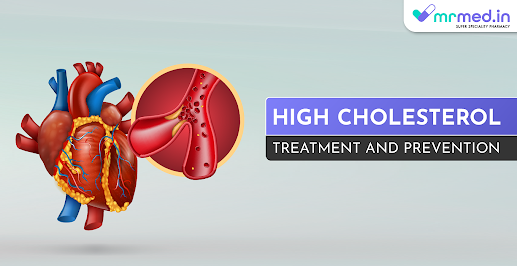High cholesterol levels risk and treatment
High cholesterol levels can pose several risks to your health, particularly to your cardiovascular system. Cholesterol is an essential fatty substance present in the bloodstream, serving a vital role in the body's functions. However, when cholesterol levels become elevated, it can result in the formation of plaque in the arteries, increasing the risk of heart disease and stroke. Here are some of the risks associated with high cholesterol levels:
1. Cardiovascular disease: Elevated levels of LDL cholesterol, commonly known as "bad" cholesterol, can increase the risk of plaque formation in the arteries. This condition, known as atherosclerosis, can be a significant factor in the development of heart disease, heart attacks, and strokes.
2. Hypertension: High cholesterol levels can contribute to high blood pressure, which in turn increases the risk of heart disease and other complications.
3. Peripheral Artery Disease: Cholesterol plaques can also affect the arteries that supply blood to the limbs, leading to reduced blood flow and potential complications.
4. Pancreatitis: Extremely high levels of triglycerides, a type of blood fat, can increase the risk of pancreatitis, which is inflammation of the pancreas.
Now, let's explore the treatments for high cholesterol:
1. Lifestyle changes: The first line of treatment for high cholesterol involves adopting a healthy lifestyle. This includes following a heart-healthy diet low in saturated and trans fats, increasing physical activity, maintaining a healthy weight, and avoiding tobacco smoke.
2. Medications: If lifestyle changes alone aren't sufficient, your doctor may prescribe cholesterol-lowering medications. Statins are generally prescribed to reduce cholesterol levels. Other medications such as ezetimibe, bile acid sequestrants, fibrates, and PCSK9 inhibitors (Evolocumab) may be prescribed in specific cases. Repatha Injection, containing evolocumab, is used in conjunction with a cholesterol-lowering diet to treat high blood cholesterol levels in individuals aged twelve and above.
3. Combination therapy: In certain cases, a combination of different cholesterol-lowering medications may be prescribed to achieve the desired cholesterol levels.
4. Regular monitoring: It's essential to regularly monitor your cholesterol levels through blood tests. This helps determine the effectiveness of lifestyle changes and medications and allows adjustments to be made as needed.
Remember, it's important to work closely with your healthcare provider to determine the best treatment approach for your specific situation. They will develop a treatment plan considering your overall health, risk factors, and any other medical conditions you may have.



Comments
Post a Comment